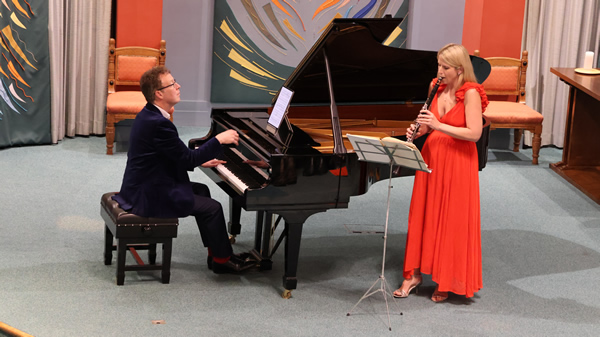Concert Review
Sarah Williamson (clarinet), Sam Haywood (piano)
18th November 2024
CLARINET VIRTUOSO
In all its 80-year history Penrith Music Club has only had four recitals of music for clarinet and piano. Despite the sudden arrival of winter temperatures, a good-sized audience turned out to hear Sarah Williamson’s recital with Sam Haywood as piano accompanist.

They were not disappointed. Resplendent in a striking red dress, Sarah gave an absolutely virtuoso performance with Sam an extremely skilled and versatile accompanist.
The concert began with Finzi’s Five Bagatelles, which since their composition in 1940 have become part of the standard clarinet repertoire. From the poetic, flowing lines of the opening prelude, the tenderness and passion of this attractive music was convincingly presented and made a fine contrast with the irony of the next item, Poulenc’s Sonata of some twenty years later. This was full of the quirkiness and individuality of Poulenc’s harmonic palate and offered some lovely mesmeric and passionate moments in the slow movement, where the composer explores the whole range of clarinet’s extensive register.
An early 19th century showpiece, Weber’s Grand Duo Concertant, completed the first half of the programme. Full of good tunes, this is a technically demanding piece for both players and the liaison between them was impeccable in the many scampering, joyous moments which this exuberant work has to offer.
The second half of the concert continued the progress through 19th century repertoire with Schumann’s Fantasiestücke and Brahms’s Eb major sonata, written almost half a century apart. Schumann’s three miniatures offered optimism and warmth, with an ever more rapturous outcome, while Brahms’s second sonata strikes a more serious mood. Beginning with one of his loveliest tunes, the spacious first movement leads to a passionate scherzo, in the middle of which comes a reflective passage of piano chords combined with the dark-hued timbre of the clarinet’s lower register, and ending with a theme and variations.
The last item offered something thrillingly different! George Gershwin originally wrote his three preludes for the piano and they were later arranged for clarinet and piano by James Cohn. Full of the jazz rhythms of the American Broadway scene of the 1920s, the first and third offered the intoxicating brashness and swagger of that era, the second a more bluesy style. As an encore, a further James Cohn arrangement, this time of the Gershwin hit “I got rhythm”, provided a foot-tapping conclusion to an excellent and varied recital.
Colin Marston